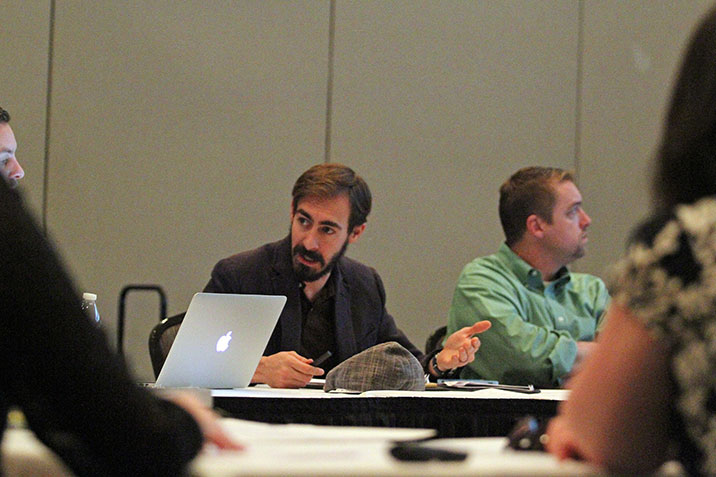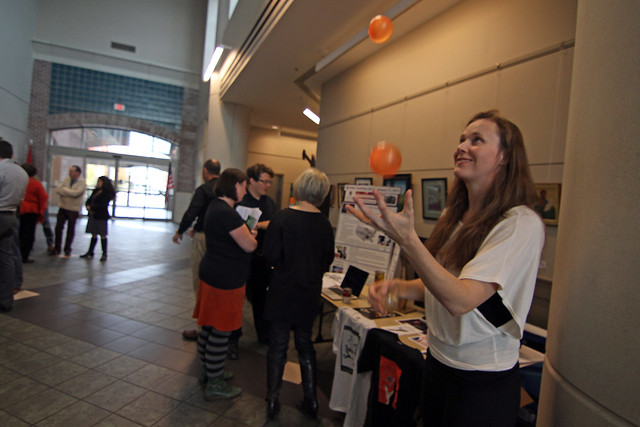
Alderman Matthew Petty, who also serves on the Fayetteville Advertising and Promotion Commission, speaks in January during the commission’s regular meeting inside the Fayetteville Town Center.
Photo: Todd Gill, Flyer staff
Fayetteville Advertising and Promotion commissioners this week made some minor changes to how they’ll help fund events in the future.
The discussion came after some commissioners showed frustration over the process used to hand out leftover tax money to event organizers.
Twice each year, the commission awards funds to groups seeking financial help promoting or starting an event. The money comes from any surplus in the commission’s budget, which is funded by half of the city’s 2 percent HMR sales tax.
Sunset clause
The commission on Monday voted unanimously to adopt a three-year sunset clause for funding events to emphasize an existing guideline that sometimes gets overlooked by the commission.
Applicants have long been told that any awards should be considered as “seed money,” but some organizations have been requesting and receiving funds for events that are many years old.
“We need to set some kind of rule to encourage new events,” said commissioner Tim Freeman. “We don’t need to continue funding the same things over and over.”
The new guideline won’t prohibit an organization from applying for funds after three years, but their requests will be placed on an exceptions list to be considered after commissioners have discussed funding for newer events.
Commissioner Matthew Petty said separating requests into two lists is a simple tweak to the process that could ensure proper consideration for newer events that need help getting off the ground.
Application changes
The group also made changes to the application process to help clear up some confusing language that might have discouraged new events. The old application stated that an organizer could only apply for funding once each year. The intent of that language, however, was to prevent double-funding of a specific event, not to prevent an organizer from requesting help for multiple events.

Ellen Winters, an organizer of the NWA Juggling Festival, juggles next to her information booth in November while A&P Commissioners meet with funding applicants in the Fayetteville Town Center.
Photo by Todd Gill, Flyer staff
Applicants will now be encouraged to show a one-to-one match for their request in the form of money, in-kind donations or staff labor.
Petty said it is a typical requirement on grant applications for applicants to prove they are capable of pulling off their idea, especially when they’re requesting tax dollars.
“One of the ways you show that is by giving us program history, and another way is by showing us that you have support from the broader community,” Petty said.
Finally, commissioners made a change to give themselves more time to consider each request and ask questions before making a funding decision. Instead of meeting with applicants an hour before awards are given, commissioners will mingle with event organizers the previous month.
University funding
A debate over whether the commission should continue to help fund University of Arkansas athletic events was put on hold Monday to give university officials a chance to plead their case next month.
University officials will be invited to attend the commission’s March meeting to explain why they continuously request tax dollars for help promoting tournaments that could be held regardless of the commission’s support.
Petty said he has asked university officials what would happen if their events didn’t receive any A&P funding, pointing to a application guideline that states, “It is not the intent of the Commission to fund requests that could be funded by the requesting organization.”

» Download revised guidelines (PDF)
“When I asked them that question directly, they said the athletic department has a policy of covering all deficits for every event,” said Petty, pointing to the university’s $75 million annual athletic budget.
Other commissioners, including Matt Behrend, said while the school might not actually need the money, a donation to the university shows appreciation for the economic impact of the school’s athletic events in Fayetteville.
“I think it’s more of a token gesture,” Behrend said Monday. “They pay a lot of money to bring those events here, and we benefit from those events.”
Commissioner Hannah Withers said while there’s no denying the exposure Fayetteville receives when the university brings in large-scale athletics events, those programs are already fully funded.
Withers said the commission limits itself by giving money to the university that could be better used to help establish new events.
“Is that token worth it?” she asked.
While Monday’s changes were not a sweeping overhaul, Petty said he was happy with the progress the commission is making toward getting the most return for taxpayer money.
“My goal here is to change the culture of this commission,” said Petty. “These discussions are a step in the right direction.”

